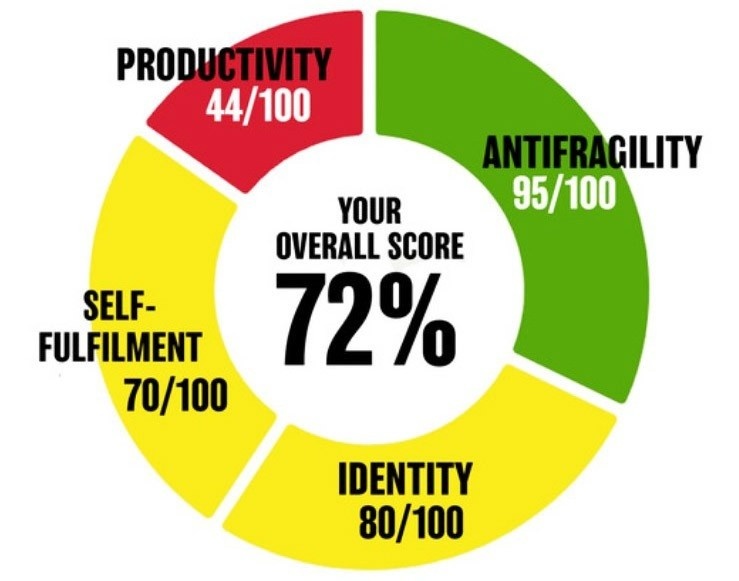SUMMARY
- Face Your Fears – A lot of people think that they need to be more confident in order to step into their fears, but they’ve got it wrong. The key skill to learn is that we step into our fears in order to build confidence.
- Practice Curious Listening – Asking curiosity-based questions, will not only deepen your connection with a person, but also teach you things that you never would have perhaps known before. This can be important for your own development as well.
- Practice Single Tasking – Did you know that the average person loses 13 weeks a year, an entire calendar quarter, because they are not working on one thing at a time? Eliminate your distractions!
- 80/20 Focus – 80/20 focus is simply recognizing that things are not all created equal. What are the 20% of the things that you can be focusing on for 80% of the benefit?
- Get Some Sleep – A lot of people are not getting the recommended eight hours of sleep. It impacts their productivity. It impacts their ability to achieve their goal. Ultimately it impacts their ability to get to where they want to in life.
- Pause! – When something happens that triggers the worst in you, do not respond right away. Pause between whatever is triggering you and responding so that you can choose the best response, the response that’s congruent with who you are at your best.
- Step into Difficult Conversations – It’s not confidence that we need to have a difficult conversation. It’s stepping into the difficult conversation that will build the confidence we seek.
- Create Consistency – Working constantly at an 80% level is better than on occasion 100%, and then 60% or 50%.
- Find an Expert – There are experts out there to help you in your quest to achieve whatever it is that you want. If you can develop the comfort to get out there and reach and connect to them, you can acquire the expertise that you need.
- Manage your time well!
TRANSCRIPT
Most people choose the wrong skills to learn in life, and as a result, don’t get to where they want to be. Today, I’m going to show you 10 skills which are hard to learn, but will pay off forever if you learn and embrace them.
Hi, my name is Eric Partaker, and as an award-winning entrepreneur and having been recognized as a CEO of the Year, I know a few things about learning hard skills and also which skills to focus on for the biggest payoff. So let’s dive straight into it with skill number one.
Skill number one is all about getting you to flip the script in terms of how you build confidence. A lot of people think that they need to be more confident in order to step into their fears, step into a new career, do something that they’ve never done before. But they’ve got it the wrong way around. We don’t need confidence to step into our fears. The key skill to learn is that we step into our fears in order to build confidence. The script is completely reversed. If you can really embrace that and step into that, then I encourage you to list out the things that you’ve been avoiding from a fear point of view, and look at those as your weights in the courage gym. When you complete them, you become stronger, so start stepping into them, at least in some form, to start building the confidence and skill that you seek.
Number two skill, curious listening. When you’re listening to somebody, don’t just let the words go in one ear and out the other. Ask the next question. Ask one layer deeper to understand what is it that really drives them. If somebody has written a book, don’t just say, “Well done.” Ask, “Why did you choose that topic to write about? What did you find most challenging about that? If you were to do it again, what might you do differently?” When you ask curiosity-based questions like these, they deepen your connection with the person, but you also learn things that you never would have perhaps seen before, which can be important for your own development as well.
Number three skill, hard to learn, but tremendously valuable, is this skill of single-tasking. Did you know that the average person loses 13 weeks a year, an entire calendar quarter, because they are not working on one thing at a time? Instead, they jump around from one thing to the next, in their Gmail, perhaps looking at their email, and then they’re off onto social media, and then they’re working on a paper and then something else. They keep jumping around throughout the course of the day, and it leads to a 28% loss in their day, which, extrapolated across a year, means that the average person loses 13 weeks a year. That’s an entire calendar quarter. And if we look across a whole 40-year career, the average person’s losing a decade, and what could you do with an extra decade? So, a key skill to learn to combat this, to reclaim those 13 weeks a year, is single-tasking.
Single tasking is nothing more than making sure when you’re working on something, you’re eliminating the distractions. You get your phone out of sight. You’re not going to jump around from one thing to the next, and you’re going to work on one thing at a time for a good chunk of time, 30 or 60 minutes. The more you single task, the less you jump around, the more of those 13 weeks you’ll reclaim every year, and you’ll feel a lot more productive.
Number four skill, very, very hard to learn, but will pay off forever is 80/20 focus. 80/20 focus is simply recognizing that things are not all created equal. What are the 20% of the things that you can be focusing on for 80% of the benefit? If you can do this, you could save so much time. You can also be applying 80/20 focus to how you’re working, the speed in which you’re working on something. So rather than work on something four or five hours, could you work on it for an hour and still create 80% of the benefit that you’re hoping to achieve? So 80/20 focus, very hard skill to learn, but pays a huge amount of benefit.
Number five skill to learn is simply getting enough sleep. A lot of people are not getting the recommended eight hours of sleep. It impacts their productivity. It impacts their ability to achieve their goal. Ultimately impacts their ability to get to where they want to in life. So prioritize your sleep, and the number one thing that I would suggest that you do to help you in that quest is just make sure all of your electronics are off one hour before bed, because doing so will help you sleep a lot more restfully. It’s scientifically proven to help you sleep more deeply and restfully if you don’t have all that artificial light stimulation, especially in that hour before heading off to bed.
Number six skill, difficult to learn, but will pay off forever, is just learning the art of pausing. When something happens that triggers the worst in you, do not respond right away. Practice pausing. Just take a deep breath, a moment, walk away, practice pausing between whatever is triggering you and then how you respond so that you can choose the best response, the response that’s congruent with who you are at your best rather than anything less.
Number seven skill that’s very difficult learned, but hugely worthwhile, is stepping into difficult conversations. Remember what I said is skill number one? It’s not confidence that we need to step into fear. It’s stepping into fear that builds confidence. Same with difficult conversations. It’s not the confidence that we need to have the difficult conversation. It’s stepping into the difficult conversation that will build the confidence we seek. Too often, I see people not expressing what they really feel, what is true to them, how they feel about somebody else’s performance. And it not only hurts in that example of that person, but it hurts them as well. So if we can master the art of stepping into difficult conversations, it will tremendously help us and have a huge payoff in the long run. So if there’s a difficult conversation that needs to be had, go forward, have the conversation. You’ll feel a lot better as a result, even though it’s difficult to do in the moment.
Number eight skill that’s hard to learn but super valuable is consistency. I’d much rather see somebody playing at an 80% level consistently than on occasion 100%, and then 60% or 50%. This is something that I was regularly used to managing for when I was building and leading various companies in the past. It’s something that you need to get good at creating and managing within yourself. The best way to create consistency is to simply measure. What gets measured gets done. And so what I would encourage you to do is pick the habits of the behaviors that you want to install in your life, and on a daily basis, up on the wall somewhere, give yourself a check on each day that you’ve completed it, and just have a simple rule of never two misses in a row. If you do that for at least a couple of months, you will develop some consistency around the change that you’re trying to create.
Number nine skill that’s hard to learn but pays off forever is the skill of being able to find the expert. There are experts out there to help you in your quest to achieve whatever it is that you want. If you can develop the comfort to get out there and reach and connect to them, you can acquire the expertise that you need. There’s a simple framework that I use called CPR, like the life-saving technique, but a little bit different, it demonstrates curiosity, as I mentioned earlier, in relation to listening. You can also demonstrate curiosity in that first connection that you’re trying to make with somebody. “Why is it that you’re doing this? That’s interesting. What can I do to further help you?” And that, by the way, is the R in the CPR, reciprocity. Seek first to give, and then you’re more likely to receive in return. What does the P stand for? Persistence, especially if you’re trying to connect to an expert who is super busy in their work or life, if at first you don’t succeed, try, try and try again. Remain persistent. Curiosity, persistence, reciprocity – one set of keys to building powerful connections and helping you find the expertise that you need, which is a key skill that will pay off forever.
And the number 10 skill that you can learn which will pay off forever’s how to manage your time well. There are two things that I recommend you do when it comes to time management. One is to have a weekly planning routine. During that routine, I want you to look at the week that’s just passed. Ask yourself what went well. Look at the week ahead. Choose the top three things that you’re going to do, and then plan them into your week. Then at the end of every day, I also want you to do the same thing, but just for the next day. Ask yourself at the end of a day, “What are the top three things I want to do tomorrow? And where can I plan those things in my day?”
So I hope you’ve enjoyed that, and if you head over to my website at ericpartaker.com, you can also subscribe to my weekly Peak Performance Insights newsletter.




